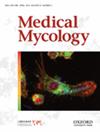Economic burden of fungal diseases in the United States.
IF 2.3
3区 医学
Q3 INFECTIOUS DISEASES
引用次数: 0
Abstract
We conservatively estimated the annual US fungal disease-related economic burden as $19.4 billion, including direct medical costs ($13.4 billion) of hospitalizations (n = 133 555) and outpatient visits (n = 13.4 million), $1.7 billion from absenteeism, and $4.3 billion from deaths (n = 7288). These findings underscore the need for fungal disease surveillance, treatment, and prevention efforts.
真菌疾病在美国的经济负担。
我们保守估计美国每年与真菌疾病相关的经济负担为194亿美元,包括住院(n = 133 555)和门诊(n = 1340万)的直接医疗费用(134亿美元),旷工造成的17亿美元,死亡造成的43亿美元(n = 7 288)。这些发现强调了真菌疾病监测、治疗和预防工作的必要性。
本文章由计算机程序翻译,如有差异,请以英文原文为准。
求助全文
约1分钟内获得全文
求助全文
来源期刊

Medical mycology
医学-兽医学
CiteScore
5.70
自引率
3.40%
发文量
632
审稿时长
12 months
期刊介绍:
Medical Mycology is a peer-reviewed international journal that focuses on original and innovative basic and applied studies, as well as learned reviews on all aspects of medical, veterinary and environmental mycology as related to disease. The objective is to present the highest quality scientific reports from throughout the world on divergent topics. These topics include the phylogeny of fungal pathogens, epidemiology and public health mycology themes, new approaches in the diagnosis and treatment of mycoses including clinical trials and guidelines, pharmacology and antifungal susceptibilities, changes in taxonomy, description of new or unusual fungi associated with human or animal disease, immunology of fungal infections, vaccinology for prevention of fungal infections, pathogenesis and virulence, and the molecular biology of pathogenic fungi in vitro and in vivo, including genomics, transcriptomics, metabolomics, and proteomics. Case reports are no longer accepted. In addition, studies of natural products showing inhibitory activity against pathogenic fungi are not accepted without chemical characterization and identification of the compounds responsible for the inhibitory activity.
 求助内容:
求助内容: 应助结果提醒方式:
应助结果提醒方式:


